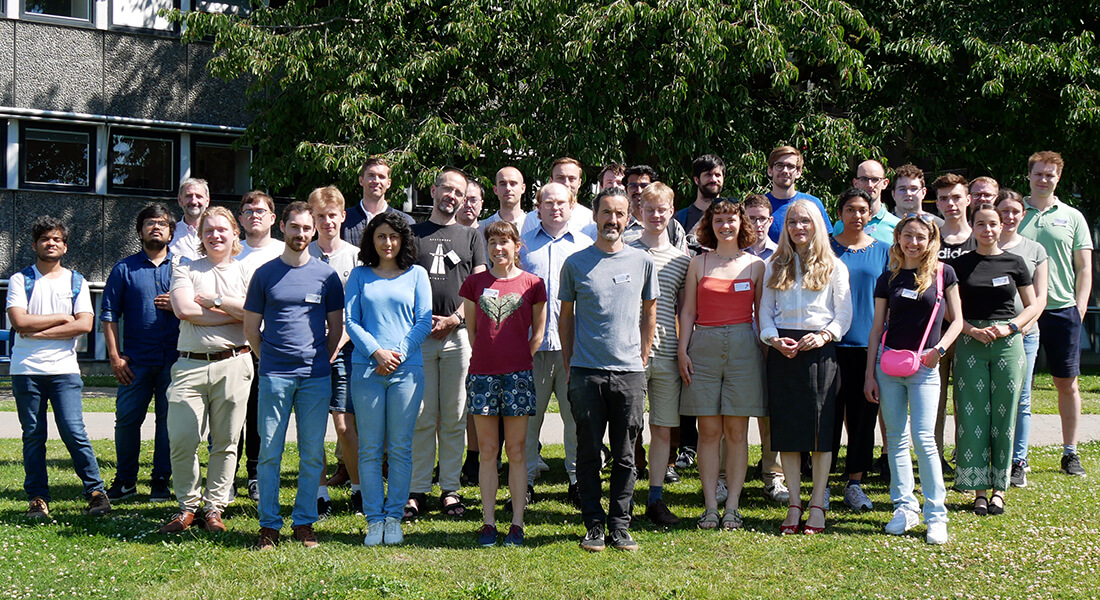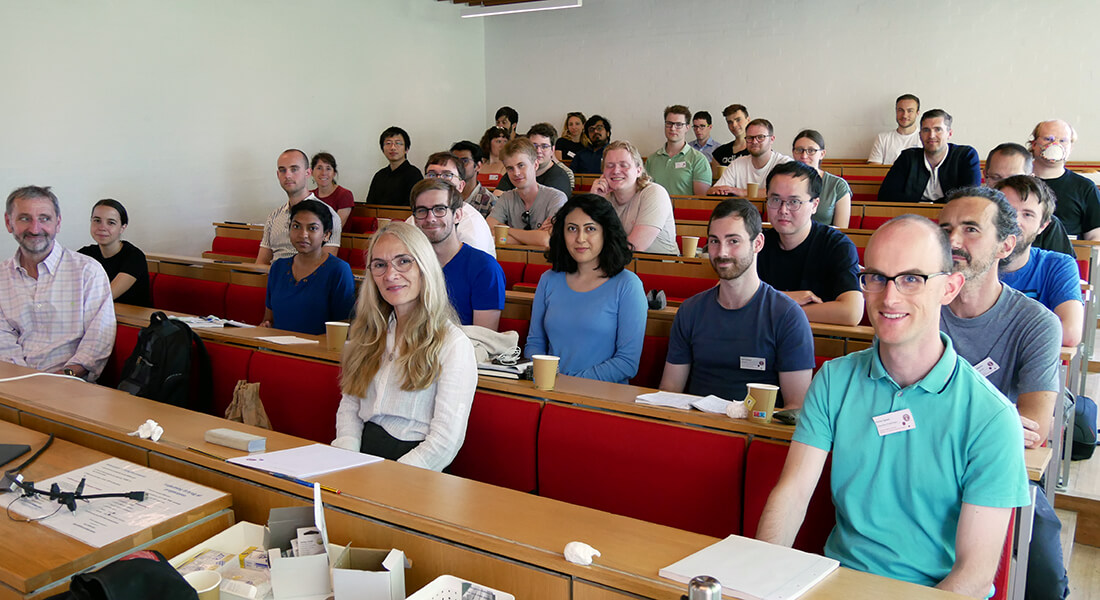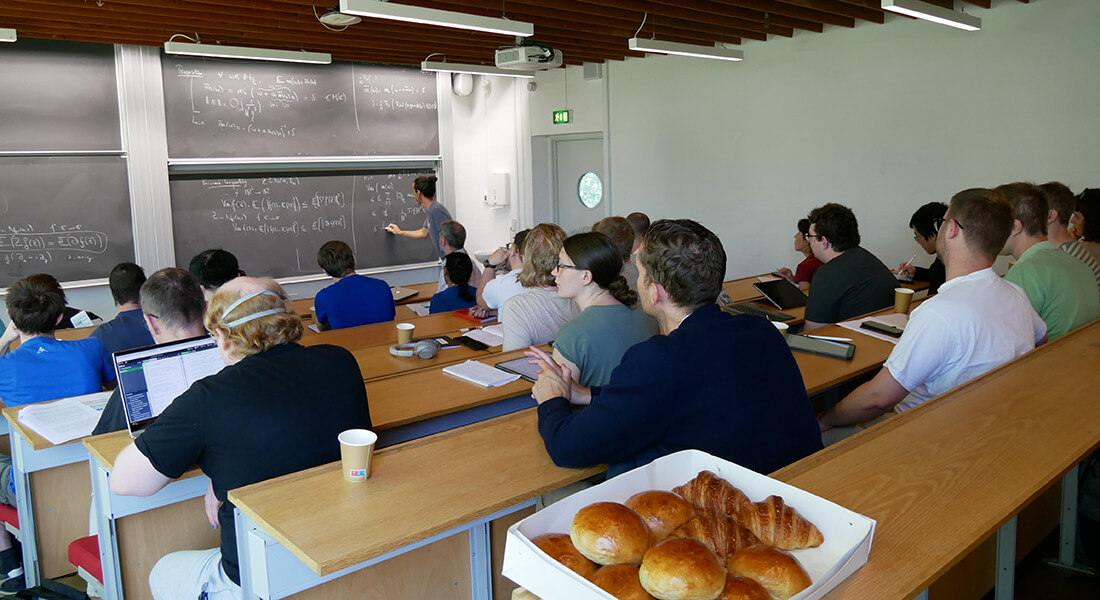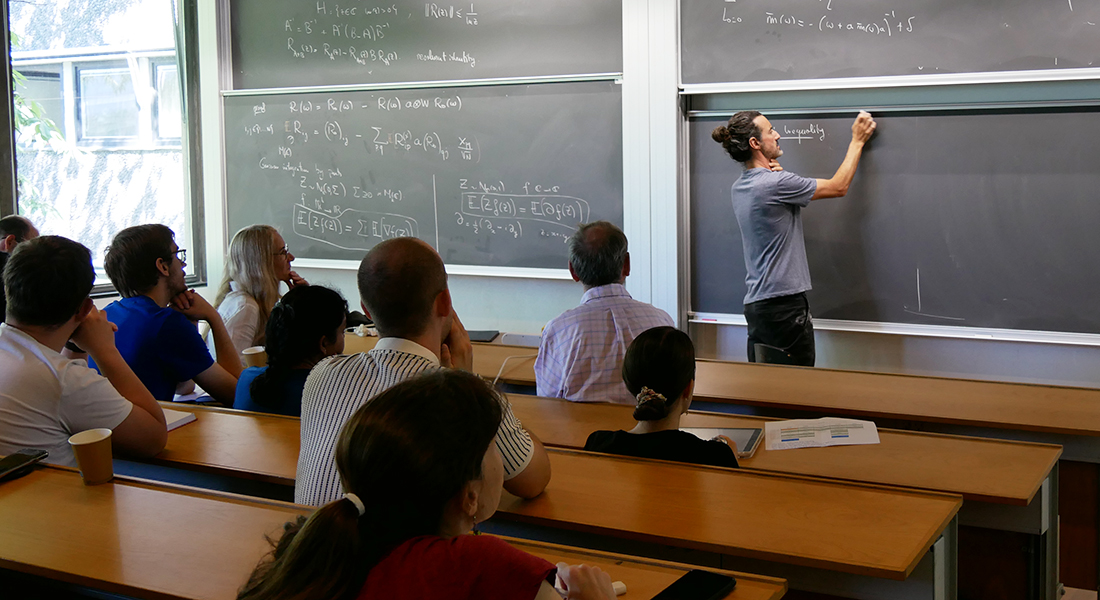Operator Algebras, Random Matrices, and Quantum Expander Graphs

University of Copenhagen
24-28 June 2024
This Master Class concerns several interconnected topics at the interface between Operator Algebras, Random Matrix theory and the recently emerged notion of Quantum Expander graphs in Computer Science and QIT. The combined lecture series will feature a general, yet comprehensive introduction to the topics, as well as current research in these areas. Applications to the Analysis of Quantum Information Theory will be prominently featured.
Below is a brief outline of the contents of each of the lecture series.
Serban Belinschi.
Title: Fundamentals of Free Probability
Abstract: Topics will include the following.
1. definition and two models, L(F_n) and the full Fock space;
2. Uffe Haagerup's R-transform (with proof);
3. freeness with amalgamation and amplification to matrices;
4. free noncommutative functions and transforms, linearization;
5. analytic description of freeness via subordination.
Charles Bordenave.
Title: Operator norms of random matrices
Abstract: The use of operator norms is ubiquitous in applications of spectral methods. In this course, we will discuss some of the techniques developed over the years to get sharp estimates on norms of random matrices. The plan is the following :
Lecture 1: illustration of the resolvent method for Gaussian unitary matrices.
Lecture 2: the expected high trace method for Wigner matrices.
Lecture 3: strong convergence of unitary representations and the linearization trick.
Lecture 4: strong convergence of random unitary and permutation matrices.
Cécilia Lancien.
Title: Quantum expanders - Random constructions & Applications
Abstract: The goal of this series of lectures will be to understand what quantum expanders are, what they are useful for, and how they can be constructed. In the first lecture, we will start by recalling the definition and main properties of classical expander graphs. We will then explain how quantum analogues of these objects can be defined. In the second lecture, we will show that, both classically and quantumly, random constructions typically provide examples of optimal expanders. We will spend some time going through the proofs in the quantum case, and see that they rely on a spectral analysis for random matrix models with a tensor product structure. In the third lecture, we will present implications of these results in terms of typical decay of correlations in 1D many-body quantum systems with local interactions.
David Pérez García.
Title: Random techniques in nonlocal games
Abstract: Nonlocal games constitute a central tool in quantum information theory, particularly in cryptographic and verification tasks. Recently, they have also emerged as an important new tool in operator algebras. This lecture will focus on how to estimate different norms for random matrices and tensors in order to obtain examples of nonlocal games with desirable extremal properties. The structure of the course will be the following:
1. An introduction to nonlocal games and their associated tensors.
2. Estimating norms of random matrices and tensors.
3. Random tensors as a source of nonlocal games with extremal properties.
Adam Skalski.
Title: Haagerup property for groups and operator algebras
Abstract: Topics will include the following.
1. Haagerup property for discrete groups: origin, examples and equivalent characterisations.
2. von Neumann algebras and C*-algebras of discrete groups: construction, some basic properties, Herz-Schur multipliers.
3. Haagerup property of von Neumann algebras: finite case, general case, relative case.
4. Maximal Haagerup subgroups and subalgebras: examples and open questions.
- Serban Belinschi, Université Paul Sabatier, Toulouse & Queen's University, Kingston.
- Charles Bordenave, Aix-Marseille Université.
- Cécilia Lancien, Institut Fourier, Grenoble.
- David Pérez García, Universidad Complutense, Madrid.
- Adam Skalski, Institute of Mathematics, Polish Academy of Science.
The program can be found here.
Lunches will be provided at the university. There will also be a reception on Monday from approximately 17:30-19:30 in the Southern end of Vandrehallen, and a dinner on Thursday starting around 17:30 on the 4th floor of the mathematics building. On Wednesday during lunch we will feature an informal discussion regarding Women in Math: Career Prospects and Perspectives.
Tentative list of participants:
| Lucas Arenstein | DIKU |
| Are Austad | University of Oslo |
| Serban Belinschi | Université Paul Sabatier, Toulouse & Queen's University, Kingston. |
| Martín Axel Blufstein | University of Copenhagen |
| Charles Bordenave | Aix-Marseille Université |
| Matthijs Borst | TU Delft |
| Igor Chełstowski | University of Warsaw |
| Enli Chen | TU Delft |
| Priyanga Ganesan | University of California San Diego |
| Atul Gothe | University of Warsaw / IMPAN |
| Huaitao Gui | University of Copenhagen |
| Torin Arunai Gundel-Reimer | Syddansk Universitet |
| James Hyde | University of Copenhagen |
| David Jekel | Fields Institute, York University |
| Luca Junk | Saarland University |
| Prem Nigam Kar | Technical University of Denmark |
| Nina Kiefer | Saarland University |
| Søren Kjærsgaard | Aarhus University |
| Cécilia Lancien | Institut Fourier, Grenoble |
| Francesca La Piana | University of Oslo |
| Nadja Lausen | University of Copenhagen |
| Viktoria Løgstrup | University of Copenhagen |
| Valentin Massicot | Université Reims Champagne-Ardenne |
| Malthe Mejlsted | University of Copenhagen |
| Lingfa Meng | University of Copenhagen |
| Paul Meunier | KU Leuven |
| Csenge Miklós | University of Copenhagen |
| Chiranjib Mukherjee | University of Münster |
| Magdalena Musat | University of Copenhagen |
| Sebastian Grau Nielsen | Aarhus University |
| David Pérez García | Universidad Complutense, Madrid |
| Pegah Pournajafi | Collège de France |
| Alexander Ravnanger | University of Copenhagen |
| Konstantin Recke | University of Münster |
| David Roberson | Technical University of Denmark |
| Mikael Rørdam | University of Copenhagen |
| Subhayan Roy Moulik | University of Cambridge |
| Björn Schäfer | Saarland University |
| Adam Skalski | Institute of Mathematics, Polish Academy of Science |
| Victoria Snow | University of Copenhagen |
| Pieter Spaas | University of Copenhagen |
| Taro Spirig | University of Copenhagen |
| Sigurd Storgaard | University of Copenhagen |
| Ali Talebi | Ferdowsi University of Mashdad |
| Villads Ussing Bojesen | University of Copenhagen |
| Josse van Dobben de Bruyn | Technical University of Denmark |
| Nikolaj Vestorp | Coinvolutio |
| Katrine von Bornemann Hjelmborg | SDU |
| Hannes Wendt | NTNU |
| Peter Zeman | Technical University of Denmark |
The conference/masterclass will take place at the Department of Mathematical Sciences, University of Copenhagen. See detailed instructions on how to reach Copenhagen and the conference venue.
Tickets and passes for public transportation can be bought at the Copenhagen Airport and every train or metro station. You can find the DSB ticket office on your right-hand side as soon as you come out of the arrival area of the airport. DSB has an agreement with 7-Eleven, so many of their shops double as selling points for public transportation.
A journey planner in English is available.
More information on the "find us" webpage.
Some convenient hotels are the following (prices may vary):
Hotel Nora: https://www.hotelnora.dk/en/
Cabinn (various locations): https://www.cabinn.com/
9 Smaa Hjem: https://9smaahjem.dk/
Further good and budget-friendly options for students, are the various hostels in Copenhagen. Here are a few suggestions:
Steel House CPH: https://www.steelhousecopenhagen.com/
Next House CPH: https://www.nexthousecopenhagen.com/
Copenhagen Downtown Hostel: https://www.copenhagendowntown.com/
A+O Nørrebro: https://www.aohostels.com/en/copenhagen/kobenhavn-norrebro/
Urban Camper: https://urbancamper.dk/
Registration is closed.
Magdalena Musat, musat@math.ku.dk
Pieter Spaas, pisp@math.ku.dk



